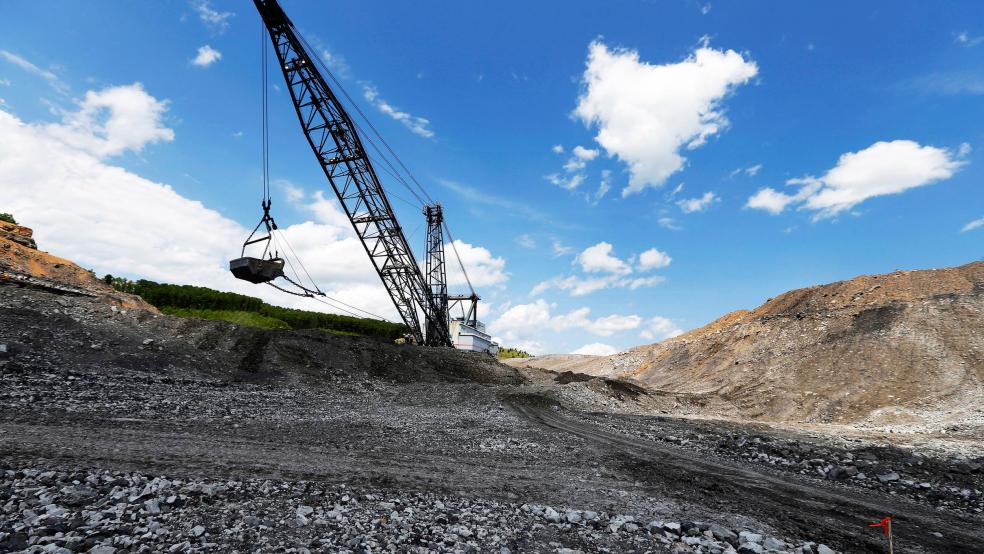President Donald Trump and his GOP allies on Capitol Hill just moved ahead with their promised rollback on Obama administration environmental rules, making it clear that concerns about climate change, clean water, and public health must take a back seat to job creation and economic expansion.
In a flurry of congressional activity, the Senate took final action early Friday morning to reverse the Stream Protection Rule, which was designed to protect 6,000 miles of streams and 52,000 acres of forests from rocks and debris generated by coal industry surface mining and so-called mountaintop removal. The House previously approved the measure, and it now goes to the White House for Trump’s signature.
Related: Environmentalists’ Worst Fears About Trump Are Coming True
That rule was deemed critical by environmentalists and public health advocacy groups in Appalachian coal communities to protect the nation’s waterways and prevent the contamination of drinking water and other public health threats.
But the Trump administration and mining industry complained that the rule could endanger up to 590 coal mining jobs and that the estimated $52 million in annual compliance costs was too steep a price to pay. Scientists say that surface mining – especially mountaintop removal – cause serious local air and water pollution and contributes to higher rates than normal of cancer, heart and lung disease, and even birth defects.
Some analyses show that economic costs of health problems in Appalachian coal mining areas are more than five times greater than the economic benefits from mining. Beyond contributing to climate change, outdoor methane leaks contribute to smog, which aggravates asthma and other respiratory conditions.
Senate Majority Leader Mitch McConnell, a Kentucky Republican and major foe of Obama administration policies, said the stream buffer rule “is a harmful regulation that unfairly targets coal jobs.” The House, meanwhile, passed a resolution today to reverse a rule from the federal Bureau of Land Management mandating companies to control their hydrocarbon emissions on public lands took effect in mid-January requiring oil and natural gas companies drilling on public lands to control methane gas emissions that directly contribute to global warming.
Related: Trump v. Truth: How Will the New Administration Make Policy?
House Republicans and the oil industry insisted that the rule would put a major crimp in energy production on federal lands by restricting drilling, reducing the number of jobs and cutting into tax and royalty payments to state and local governments.
“It is a costly rule and totally unnecessary rule,” said Rep. Rob Bishop (R-UT), chairman of the Natural Resources Committee, according to The Hill. “This rule’s repeal is a vote for people, and making sure that their lives are better, not worse.”
Taken together, the two actions constitute a stern warning from the Trump administration that scores of environmental regulations will be put on the chopping block. Trump, a global warming skeptic who once dismissed climate change as a “hoax,” has nominated an arch foe of the Obama administration’s anti-coal, clean power policies to head the Environmental Protection Agency (EPA).
Senate Republicans on Thursday used their majority to suspend committee rules and push through Trump’s choice, Scott Pruitt, bypassing Democrats who had refused to show up for a vote on his nomination. Pruitt, Oklahoma’s attorney general, has been a leading advocate against what he calls “EPA’s activist agenda” and filed briefs in 14 lawsuits against EPA policies, including President Obama’s signature clean power initiative to reduce industrial carbon emissions.
Related: The Republican War on Obama’s Regulations Is About to Begin
In both congressional actions to roll back the Stream Protection Rule and the oil and gas drilling rules, Congress invoked an obscure law, the Congressional Review Act. That law allows lawmakers to rescind executive actions taken during the previous 60 legislative work days if the rule threatens to impose excessive costs or exceeds presidential authority.
Until now, the 1996 Congressional Review Act was invoked only once by Congress, during the Clinton administration, and was conceived of as a rifle shot to be held in abeyance except in cases of extreme presidential overreach. But as part of the planned, all-out warfare against Obama environmental protections, House and Senate Republican leaders intend to use the CRA to go after a wide array of provisions.
Trump championed the fast declining coal industry during the campaign and blamed the overly zealous environmental policies of the Obama administration as a principal cause of economic despair in coal country. He has promised mining communities in West Virginia, Kentucky and other Appalachian areas that he would help bring back jobs – in part by getting rid of onerous regulations like the Stream Protection Rule.
That rule would have virtually eliminated exceptions to a requirement for a 100-foot buffer between surface coal mining and streams. The rule would also have forced coal companies to restore streams, and adjoining forests and land to conditions similar to those before mining took place.
Related: No, Trump Did Not Just Roll Back Sanctions on Russia
While highly efficient in maximizing coal production, mountaintop removal is not only a brutal disfigurement of a natural resource; it is notorious for deforestation, destruction of headwater streams, and the contamination of downstream surface waters. Those mining practices over the years have killed fish and wildlife and posed public health problems for residents in the area.
What’s more, imposing the regulation is not a job killer. Fewer miners are needed to operate massive bulldozers and cranes used in blasting away the sides and tops of mountains. A recent Congressional Research report outlining the pros and cons of the rule noted that even without the measure, the coal industry would decline by more than 15,000 workers, from a total of 90,000 in 2012.





